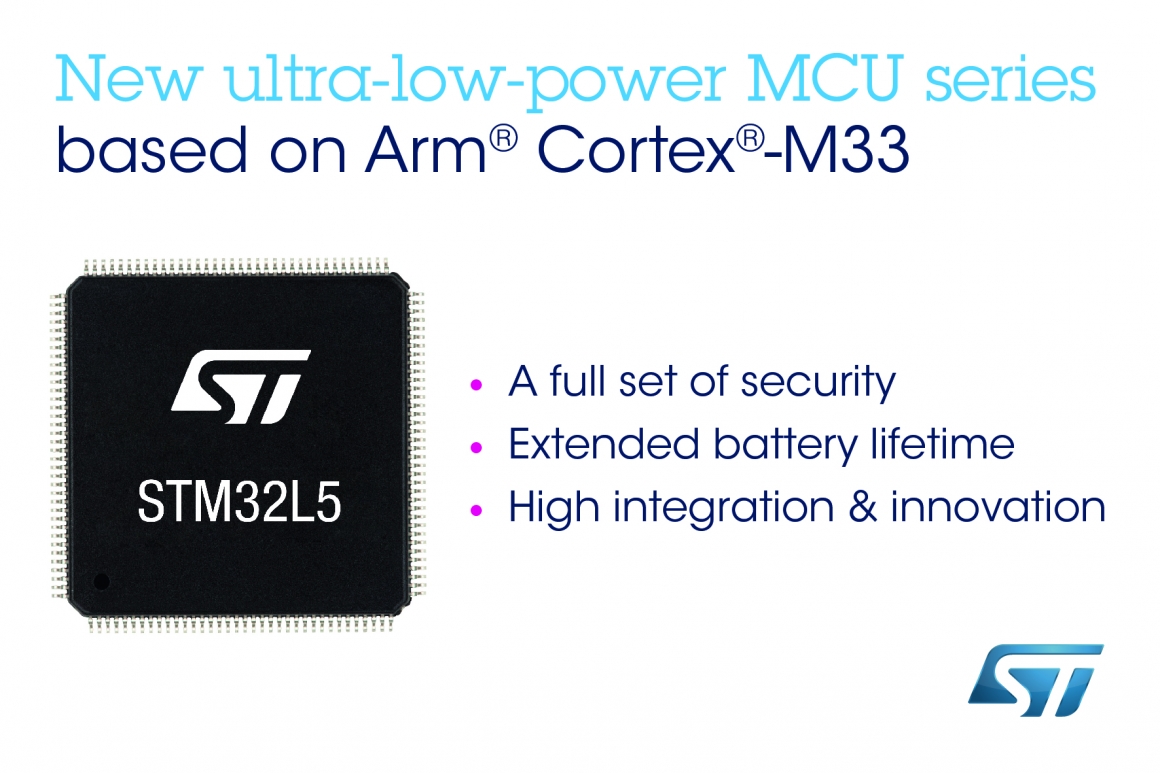Subscribe to EDOM TECH Newsletter
STMicroelectronics
2018/10/17
STMicroelectronics Introduces STM32L5 Ultra-Low-Power Microcontrollers for a More Secured IoT

- Builds on Arm® TrustZone® hardware-based cyber protection for resource-constrained connected devices
- ST-proprietary ultra-low-power technologies create class-leading MCU for energy-conscious applications
- Contains support for secure boot, full hardware isolation, hardware crypto accelerators, strengthens protection, enhances flexibility
STMicroelectronics (NYSE: STM) , a global semiconductor leader serving customers across the spectrum of electronics applications, is bringing sophisticated cyber-protection to power-conscious connected devices with the new STM32L5 microcontroller (MCU) series featuring the Arm® Cortex® -M33 core.
Building on the Cortex-M33, which boosts protection for small devices by integrating Arm’s TrustZone® hardware-based security, ST’s STM32L5-series MCUs add further enhancements including flexible software isolation, secure boot, key storage, and hardware cryptographic accelerators. They also provide rich functionality, high performance, and long run-times powered by coin cells or energy harvesting. Consuming as little as 33nA in shutdown mode and achieving 402 ULPMark-CP in the EEMBC[1] ULPBench, the new MCU series builds on the Company’s expertise in low-power techniques such as adaptive voltage scaling, real-time acceleration, power gating, and multiple reduced-power operating modes proven in previous STM32L series.
“The STM32L5 series with TrustZone and additional custom protection features considerably strengthens and hardens cyber-protection for small IoT devices,” said Ricardo De Sa Earp, Microcontroller Division General Manager, STMicroelectronics. “Also featuring our unique energy-saving technologies, rich connectivity, and smart digital and analog peripherals, these devices will be the first choice to host cutting-edge connected applications.”
With extensive integrated digital and analog peripherals, and consumer and industrial interfaces such as CAN FD[2], USB Type-C™, and USB Power Delivery, STM32L5 MCUs provide an ideal platform for products such as industrial sensors or controls, home-automation devices, smart meters, fitness trackers, smart watches, medical pumps or meters, and many others. STM32L5-series microcontrollers are sampling now and scheduled to begin production in Q2 2019.
ST will unveil the STM32L5 series MCUs in a demonstration, created in collaboration with security-software specialist Prove & Run at Arm TechCon, October 16-18, in San Jose, California.
“IoT devices are increasing in intelligence and functionality, and security needs to be built in from the ground up,” said John Ronco, vice president and general manager, Embedded & Automotive Line of Business, Arm. “Arm’s Platform Security Architecture (PSA), a common framework for security implementation, aims to put security at the heart of IoT. The STM32L5 series makes it easier for developers to build trusted devices on the PSA framework with the Cortex-M33 processor, TrustZone technology and enhanced SoC security features.”
Dominique Bolignano, President & Founder of Prove & Run, provider of the ProvenCore-M secure RTOS, said, “Working with ST to prepare the demonstration, we clearly see how to leverage STM32L5 hardware features to increase the protection needed for connected devices to handle the latest cyber threats.”
Further technical Information:
STM32L5 series users get extra freedom to include or exclude each I/O, peripheral, or area of Flash or SRAM from TrustZone protection, allowing sensitive workloads to be fully isolated for maximum security. In addition, ST has engineered TrustZone to ensure support for secure boot, special read-out and write protection for integrated SRAM and Flash, and cryptographic acceleration including AES 128/256-bit key hardware acceleration, private key acceleration (PKA), and AES-128 On-The-Fly Decryption (OTFDEC) to protect external code or data. Active tamper detection and support for secure firmware install are also included.
In addition to the flexible power-saving operating modes and ST’s ultra-low-power technologies, the STM32L5 series also features a highly efficient switched-mode step-down regulator that improves low-power performance when the VDD voltage is high enough and can be powered up or down on-the-fly.
Leveraging high core performance, including support for DSP instructions and floating-point arithmetic, STM32L5 series MCUs achieve up to 165 DMIPS/427 CoreMark[3]™ using the ST ART Accelerator™ at 110 MHz. As a novel enhancement in STM32L5 MCUs, the proven ST ART Accelerator now supports both internal Flash and external memory with an 8KByte instruction cache for greater efficiency in case the software runs out of external memory.
512 Kbyte dual-bank Flash allows read-while-write operation to aid device management and ensures a high level of safety by supporting Error Correction Code (ECC) with diagnostics. There is also a 256Kbyte-SRAM and features to support high-speed external memory including single, dual, quad, or octal SPI and Hyperbus Flash or SRAM, and an interface for SRAM, PSRAM, NOR, NAND or FRAM.
The STM32L5 series also introduces new digital peripherals including USB Full Speed with dedicated supply allowing customers to keep USB communication even when the system is powered at 1.8V, and a UCPD controller compliant with USB Type-C Rev. 1.2 and USB Power Delivery Rev. 3.0 specifications.
Smart analog features include a state-of-the-art analog-to-digital converter (ADC), two power-gated digital-to-analog converters (DAC), two ultra-low-power comparators, and two operational amplifiers with external or internal follower routing and programmable-gain amplifier (PGA) capability.
The STM32L5 series is available in standard temperature grade for consumer and commercial applications, or high-temperature grade specified from -40°C to 125°C for challenging environments.
For further information please visit www.st.com/stm32l5
[1] EEMBC: Embedded Microcontroller Benchmarking Consortium
[2] CAN FD: CAN with flexible data rate, offering greater flexibility to optimize bandwidth and data payload.
[3] CoreMark: industry-accepted EEMBC framework for comparing microcontroller/CPU performance.






